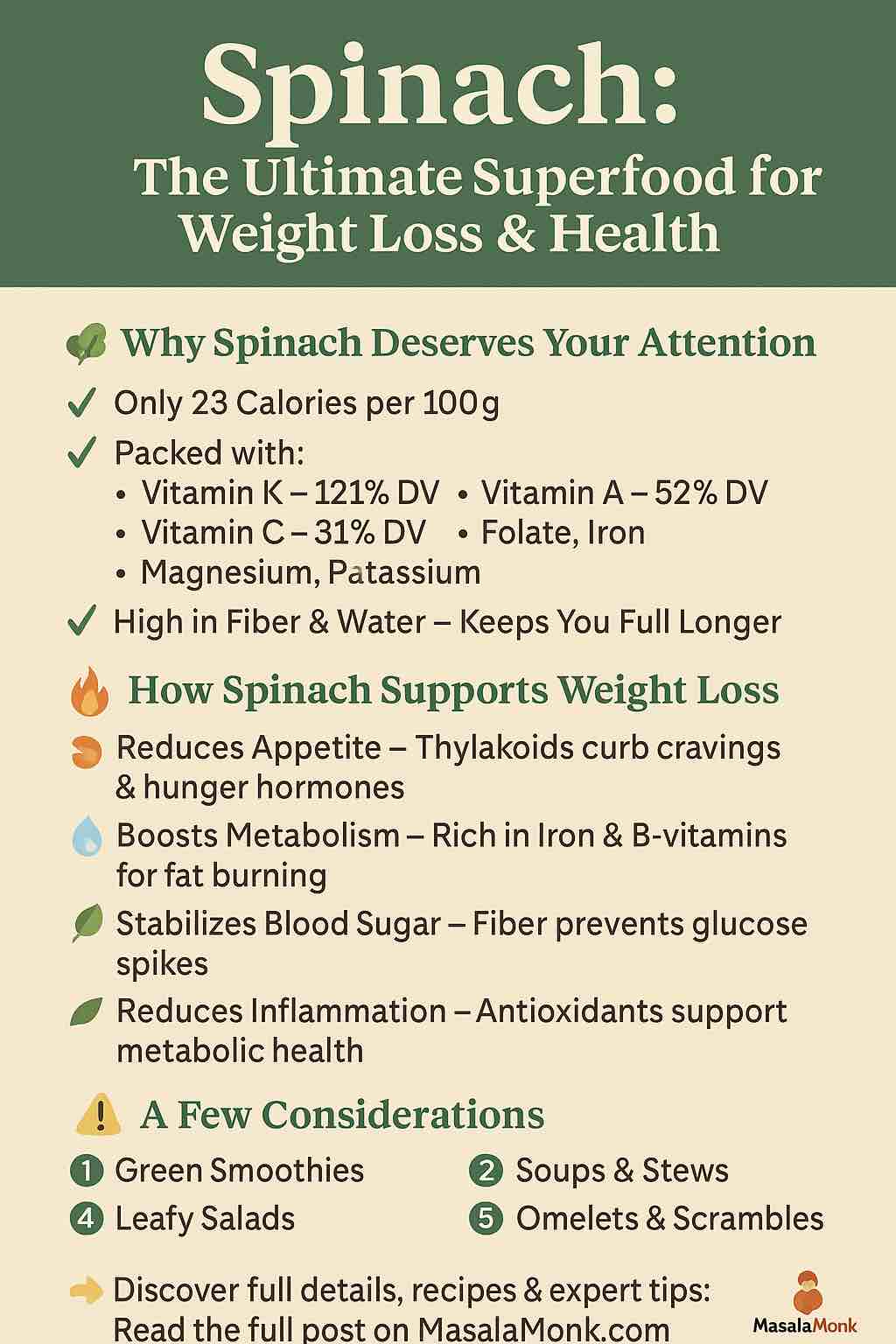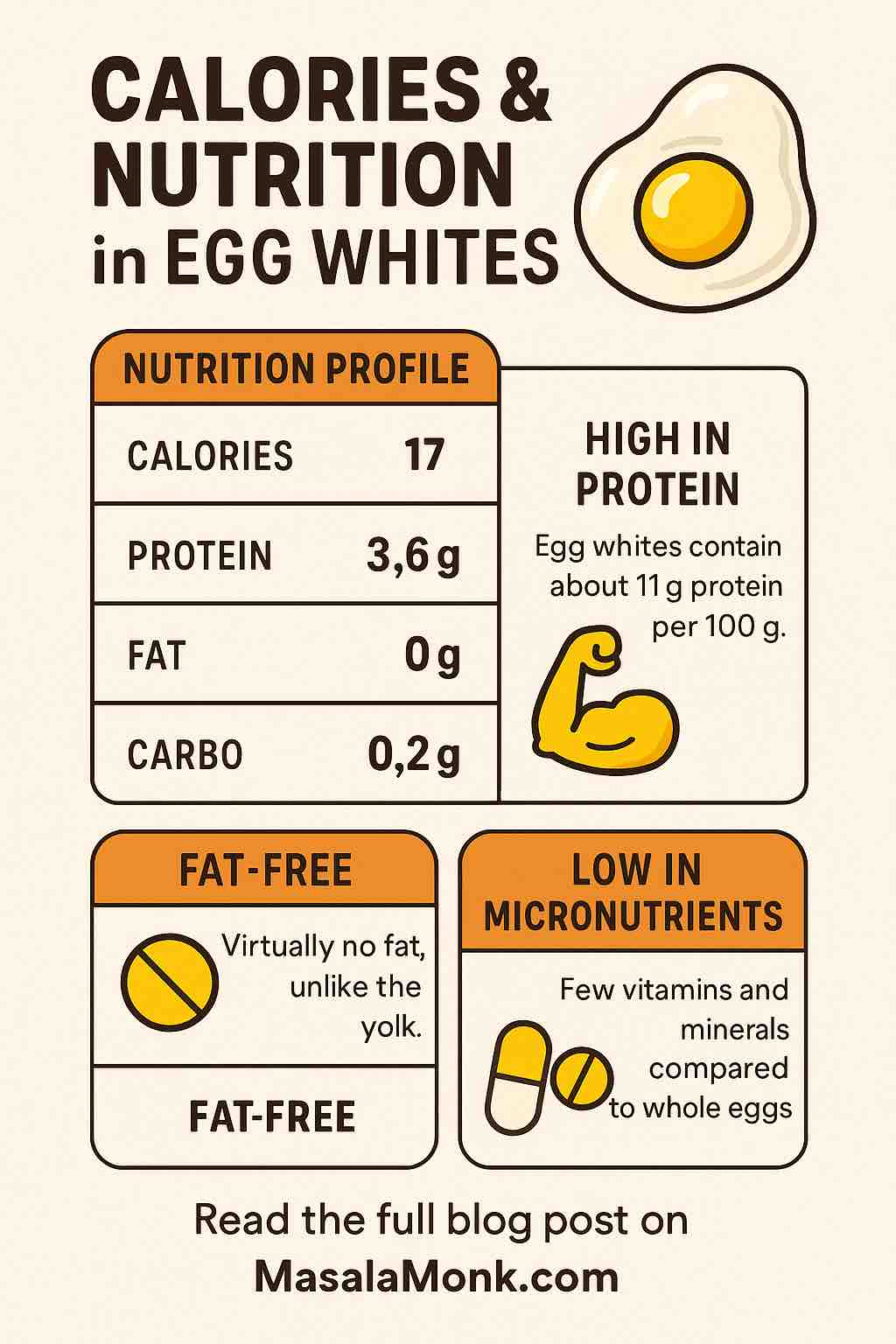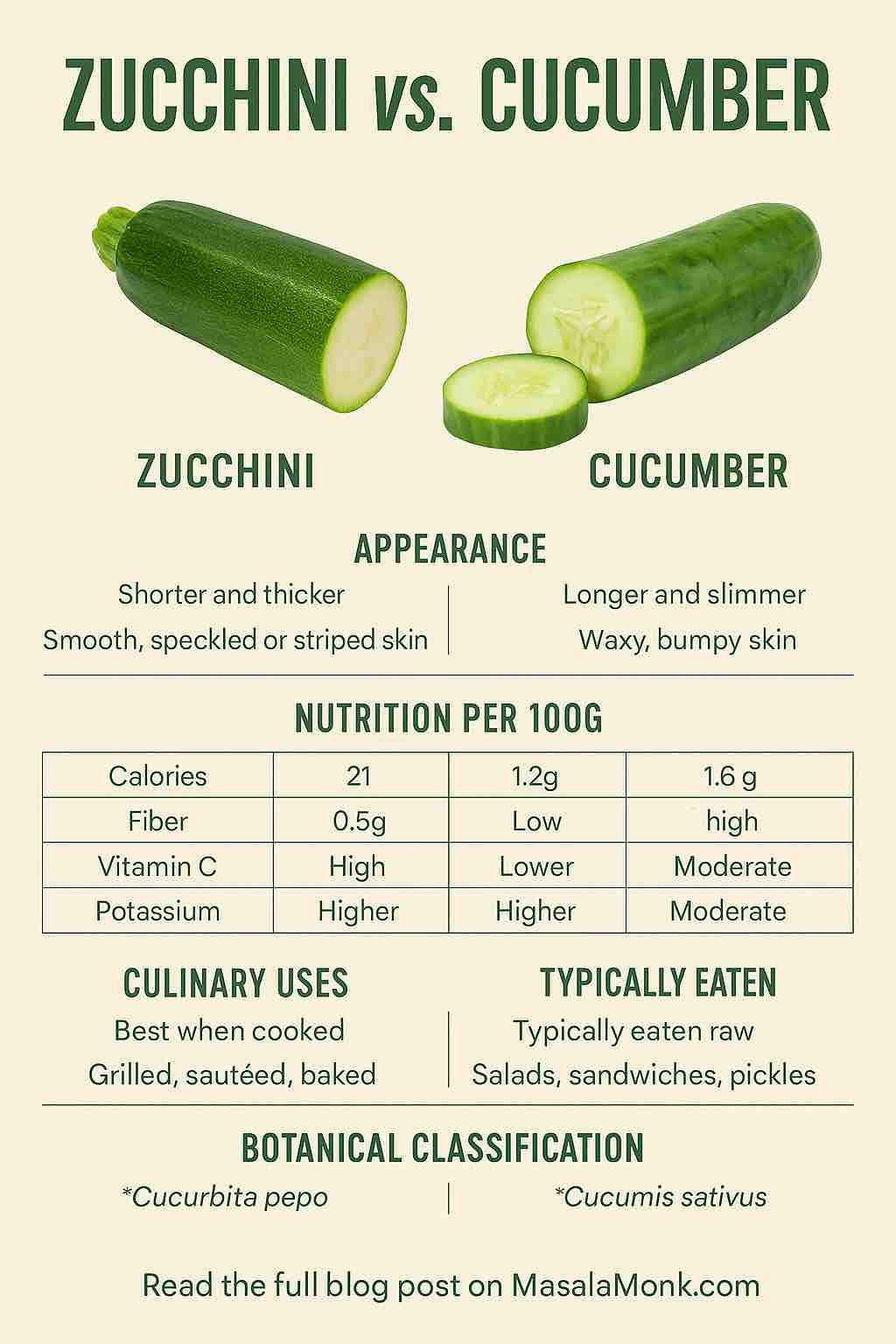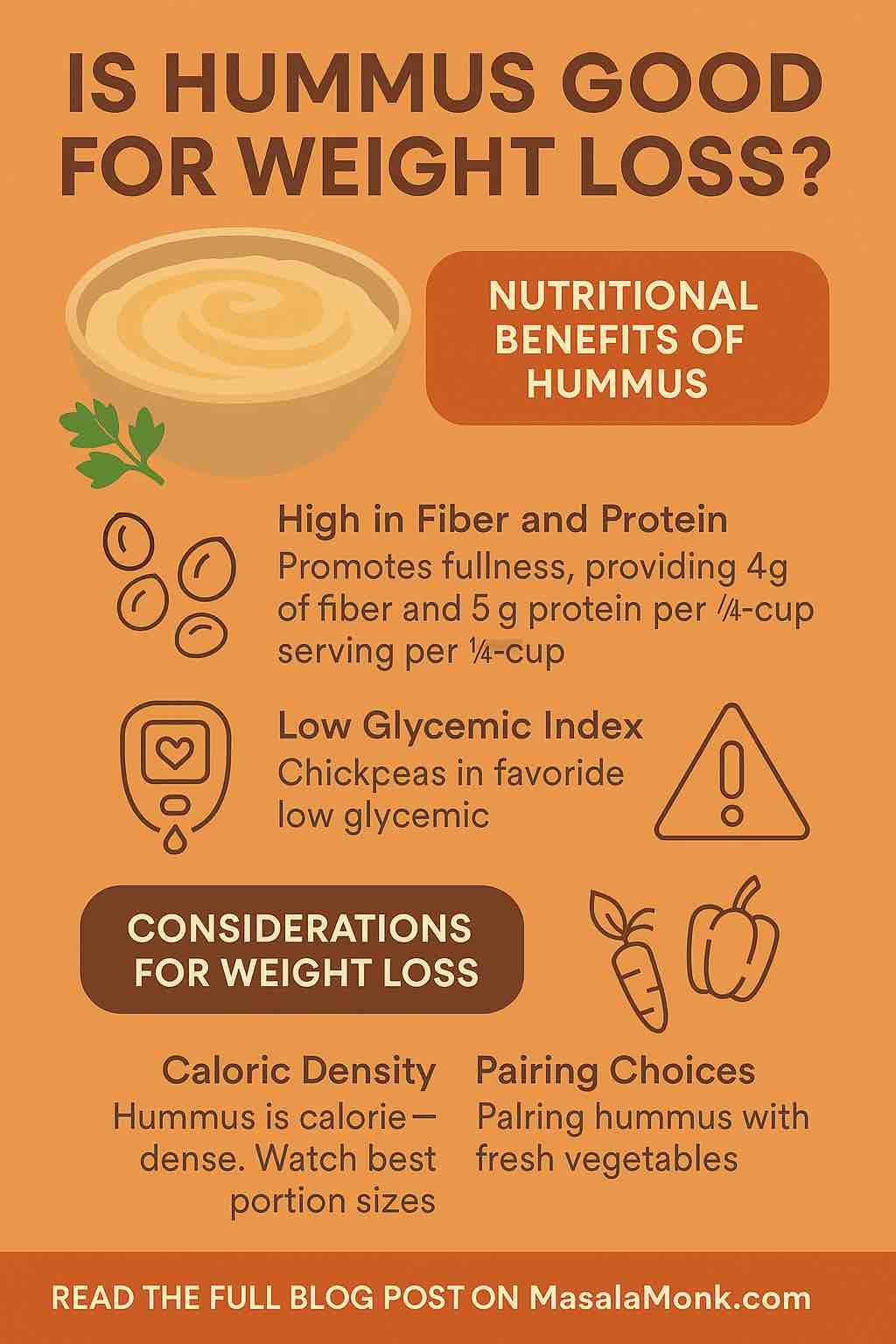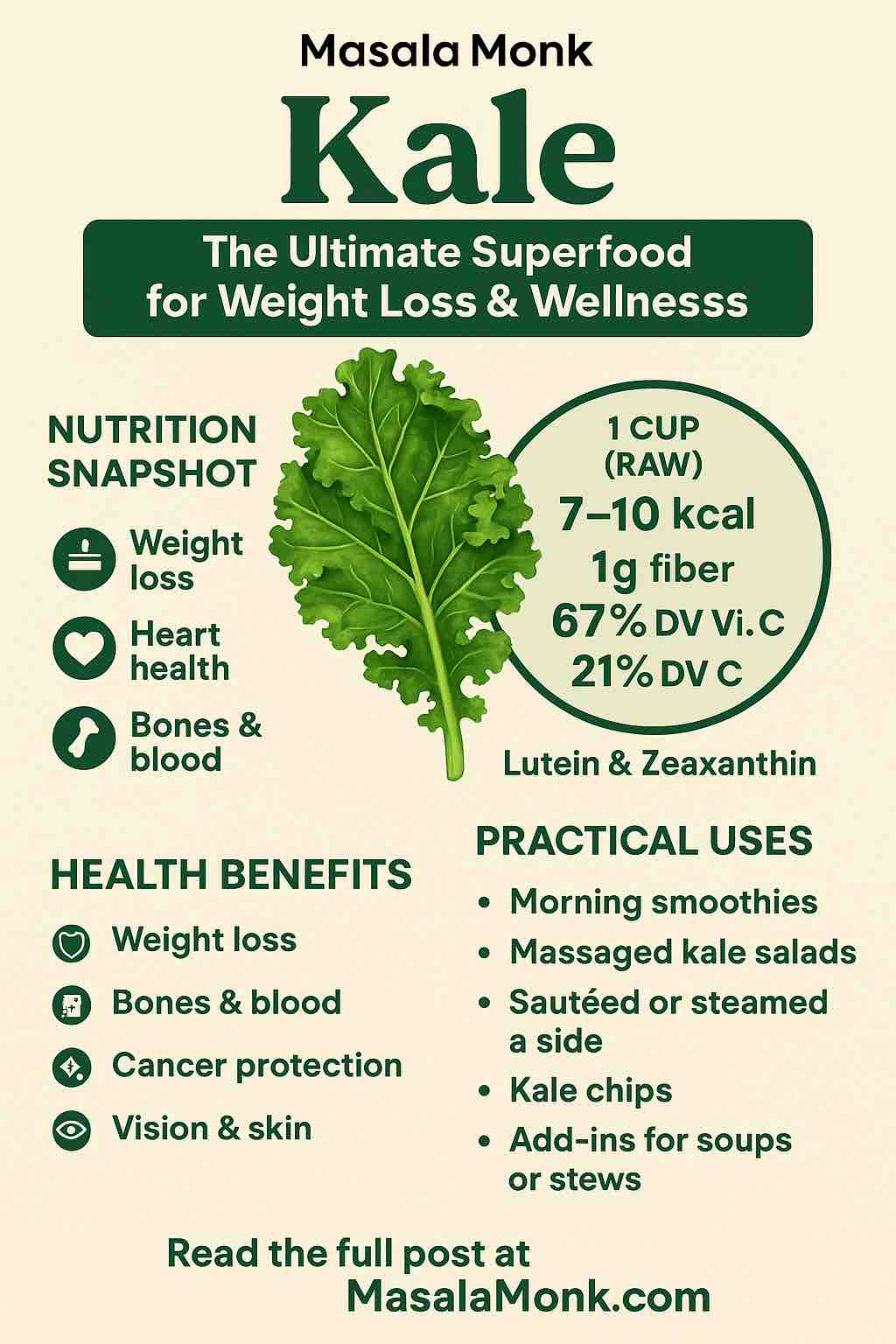
Kale — the dark, leafy green once reserved for garnish — has become a full-blown nutritional powerhouse. Whether you’re aiming to shed a few pounds, eat clean, or boost your micronutrient intake, kale deserves a front-row seat on your plate. But what exactly makes kale such a smart addition to your diet, and how can you use it effectively to support weight loss?
In this post, we explore the latest science, core health benefits, and five easy, delicious ways to make kale work for your weight loss goals — based on 2024–2025 clinical findings and real-world dietary advice.
🧪 Kale’s Nutritional Breakdown (Per 1 Cup Raw – ~20 g)
| Nutrient | Amount | % Daily Value (DV) |
|---|---|---|
| Calories | 7–10 kcal | — |
| Protein | 0.6–0.9 g | — |
| Fiber | ~1 g | ~4% |
| Vitamin K | ~67% | 💪 Bone & clotting |
| Vitamin A | 6–200% | 👁️ Eye & immune |
| Vitamin C | 21–134% | 🛡️ Antioxidant |
| Calcium | ~50–90 mg | 🔩 Bone health |
| Potassium | ~79 mg | 💓 Blood pressure |
| Manganese | ~0.2 mg | 🔧 Enzyme support |
| Lutein/Zeaxanthin | ~39 mg | 👁️ Retinal health |
Kale is low in calories and rich in fiber, antioxidants, and micronutrients — all of which play a vital role in appetite control, detoxification, and energy metabolism.
🧠 The Science-Backed Health Benefits of Kale
1. 🌿 Weight Loss & Metabolic Health
In a 2024 clinical trial, participants who took 3 g of freeze-dried kale three times daily experienced measurable reductions in:
- Weight
- Waist circumference
- Triglyceride levels
- Fasting glucose
This makes kale not just a healthy side dish, but a therapeutic food for weight management.
✅ Pro Tip: Even without supplements, adding 2–3 cups of kale daily to meals can promote fullness and curb cravings naturally.
2. ❤️ Heart Health
Kale’s potassium, fiber, and antioxidants can help:
- Lower LDL cholesterol (bad cholesterol)
- Regulate blood pressure
- Protect against arterial plaque via glucosinolates and polyphenols
A regular intake of kale is associated with better lipid profiles and reduced heart disease risk.
3. 🔍 Vision, Skin, and Immunity
Thanks to compounds like lutein and zeaxanthin, kale helps filter blue light and prevent age-related macular degeneration. Plus:
- Vitamin C boosts collagen for glowing skin.
- Vitamin A supports immune resilience.
4. 🦴 Bone Density
With its low oxalate profile and high bioavailable calcium, kale supports:
- Bone remineralization
- Joint and cartilage health
- Improved vitamin K-dependent bone metabolism
5. 🧬 Cancer-Fighting Potential
Kale contains sulforaphane precursors and glucosinolates, shown in early studies to detoxify carcinogens and reduce inflammation. While clinical evidence is still evolving, its role in preventive nutrition is promising.
⚠️ What to Watch Out For
While kale is a superfood, moderation and preparation matter:
- Thyroid concerns: Raw kale contains goitrogens, which can affect thyroid hormones if overconsumed (especially in people with iodine deficiency). Cooking helps.
- Oxalates & kidneys: Those prone to kidney stones may want to limit extremely high kale intake or rotate with lower-oxalate greens.
- Vitamin K & medications: High vitamin K can interfere with blood thinners like warfarin.
✅ Pro Tip: Steaming or sautéing kale reduces oxalates and goitrogens while enhancing nutrient absorption.
🥗 5 Practical & Delicious Ways to Use Kale for Weight Loss
1. 🌅 Morning Green Smoothie
Blend kale with banana, Greek yogurt, chia seeds, and unsweetened almond milk. It’s fiber-rich and keeps you full until lunch.
✔ Recipe Tip: Use 1 cup kale, ½ banana, 1 tbsp chia, ½ cup yogurt.2. 🥗 Massaged Kale Salad
Tear kale leaves, discard stems, and massage with olive oil, lemon juice, and salt to soften. Add avocado, berries, and pumpkin seeds.
✔ Why it works: Massaging makes kale more digestible and less bitter.3. 🍽️ Sautéed Kale Side
Quickly sauté chopped kale with garlic, a splash of veggie broth, and chili flakes. Serve warm next to lean protein or grains.
✔ Bonus: Light cooking boosts calcium and iron availability.4. 🍿 Kale Chips (Guilt-Free Snack)
Toss with olive oil, nutritional yeast, sea salt, and bake until crisp at 300°F (15–20 min).
✔ Crunch factor without the carbs or oils of regular chips.5. 🍲 Add to Soups & Stews
Stir chopped kale into lentil soup, chicken stew, or chili during the last 5 minutes of cooking. Adds fiber and micronutrients.
✔ Kale holds its texture better than spinach in hot dishes.🧭 How to Make Kale a Long-Term Habit
✅ Rotate types: Try curly, Lacinato (dino kale), and red Russian for variety.
✅ Meal prep: Pre-wash and chop kale for quick grab-and-go additions.
✅ Combine with healthy fats: Olive oil, nuts, or avocado boost absorption of fat-soluble vitamins (A, K).
✅ Track your response: If using powdered kale supplements, monitor glucose and digestion.
🔚 Final Thoughts
Kale is more than a trend — it’s a nutritional cornerstone that supports sustainable weight loss, vibrant health, and disease prevention. Whether you’re blending it into smoothies, baking it into chips, or simply tossing it in a salad, it’s one of the most practical and proven additions to your wellness routine.
🌱 Start with small steps:
- Add 1 cup of kale to one meal per day.
- Try a kale smoothie 3x a week.
- Mix kale with other greens to keep things interesting.
Your body — and your waistline — will thank you.
🧠 10 FAQs About Kale and Weight Loss
1. Can eating kale every day help me lose weight?
Yes, kale is low in calories and high in fiber, which promotes satiety and reduces cravings. Including 1–3 cups of kale in meals can naturally support calorie control. Clinical studies (2024) even show that freeze-dried kale can lead to weight and fat loss in obese individuals when used regularly.
2. What’s the best time of day to eat kale for weight loss?
There’s no strict “best” time, but many benefit from eating kale at breakfast or lunch — in smoothies or salads — because it helps regulate appetite and blood sugar throughout the day.
3. Is raw or cooked kale better for weight loss?
Both are excellent. Raw kale preserves vitamin C and fiber, while light cooking (steaming, sautéing) reduces anti-nutrients (like oxalates) and enhances mineral absorption, making cooked kale more digestible for some.
4. How much kale should I eat daily for noticeable results?
Aim for 1.5 to 3 cups daily (fresh), or up to 9 g/day of powdered kale as used in recent studies. Spread across meals, this amount is generally well-tolerated and effective for nutritional impact.
5. Can kale upset my stomach or cause bloating?
Yes, in some people. Kale is high in fiber and sulfur compounds. If you’re not used to a high-fiber diet, start slowly and cook kale to reduce gas. Massaging raw kale also helps break down tough fibers.
6. Can people with thyroid issues eat kale?
Yes, but in moderation. Raw kale contains goitrogens which can interfere with thyroid function if eaten in excess. Cooking deactivates most goitrogens. People with hypothyroidism should consult their doctor before consuming large amounts regularly.
7. Is kale better than spinach for weight loss?
They’re both excellent, but kale has less oxalate, more vitamin C, and is lower in calories per cup than spinach. However, rotating greens gives the best nutritional variety and avoids overexposure to any single compound.
8. Can I drink kale juice instead of eating it?
You can, but juicing removes most fiber, which is key for weight loss. Smoothies are better than juices because they retain all the fiber. If you juice, pair kale with high-fiber veggies like cucumber or celery.
9. What kind of kale is best?
All types are beneficial. Curly kale is the most common, Lacinato (dino) kale is less bitter and easier to cook, and Red Russian kale offers a slightly sweeter taste. Choose what suits your recipes and palate best.
10. Can I take kale supplements instead of eating it?
You can use freeze-dried kale powder or capsules, especially if you’re on the go. Research shows they can support metabolic improvements. Still, real food gives you fiber, water content, and satiety — so supplements should complement, not replace, whole kale.

